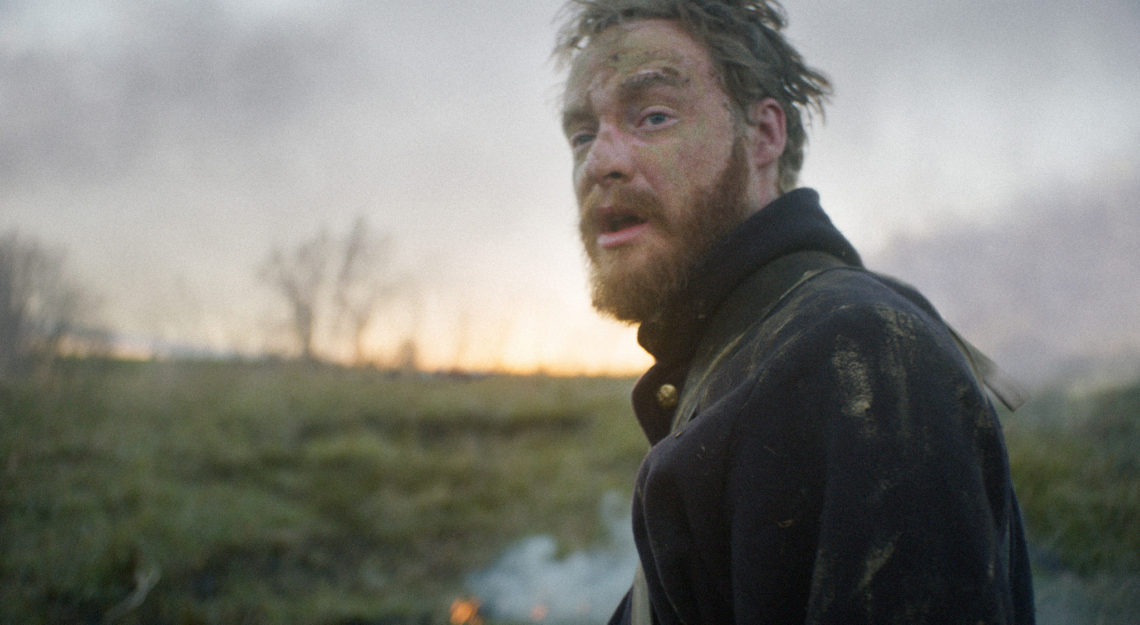I. Small’s Corner, Kentucky. November 1861. Two brothers struggle to sell off some of their barren land as winter approaches. They spend their time bickering, drinking, and playing practical jokes on each other. While they live out their aimless lives, striving to fit in with their betters, a war rages on beyond the confines of their town. No one thinks it’ll last too long, but the brothers don’t even notice it’s happening, until one of them abruptly skips town to join the army after an embarrassing moment leaves him shaken.
Zachary Treitz’s minimalist Civil War film Men Go to Battle follows a year in the lives of Henry and Francis Mellon (Tim Morton and David Maloney) as they come together and break apart, just like the nation around them. Light on plot and heavy on reflective imagery, the film operates as a restrained comedy, complete with the rhythms of a certain brand of American indie cinema, but not beholden to its tropes or clichés. Using its very modest budget to its advantage (period detail instead of epic sweep, two-person scenes instead of battles, etc.), Treitz constructs a subtly restless film, one that refuses to remain in a single mode and fall into a familiar pattern. Instead, it morphs in unexpected ways, taking a sharp look at brotherly love and worldly indifference, and how people and the world can change completely in the blink of an eye.
But Treitz and co-writer Kate Lyn Sheil bury all hints of that in the subtext, as they’re far more content to witness a classic brotherly dynamic in action rather than speechify. For the first third of the film, Francis and Henry work together and walk around each other. Their distinct personalities—Francis is obnoxious and spontaneous, while Henry is shy and contemplative—belie much outward affection, but they clearly have a rapport. However, tensions run high when they’re struggling to make ends meet and Francis blows some money on two mules that they won’t be able to use until the spring. Since the two mostly communicate through monosyllabic commands or murmured complaints, the conflict never quite boils over into violence until Francis accidentally injures Henry with an axe. They then go into town for medical attention where Francis crashes a high-society party and Henry tries to make a pass at Betsy Small (Rachel Korine), the daughter of Small’s Corner’s most prominent family, only for him to be rebuffed. Henry hightails it down a street and out of everyone’s lives until Francis receives a letter from him saying he’s joined the Union army.
Though Men Go to Battle arguably peaks with its first section because of Morton and Maloney’s fantastic chemistry, the film becomes much more interesting when it essentially abandons its low-stakes buddy comedy about small-town farm life. It instead becomes individual portraiture, first of Francis as he deals with the farm alone, shivering in his cabin and chopping firewood like his life depends on it, and then of Henry as he adjusts to army life. Though soldiers may sing songs and march with Henry, Treitz exclusively maintains focus on him, as if he’s the only soldier on the battlefield, and when his troop abandons him after believing he’s dead, he’s alone in the wilderness with nowhere to turn. Brett Jutkiewicz’s isolating photography excels at capturing the loneliness of Francis and Henry, but Treitz hardly lingers on it, but treats it practically and plainly. If there’s any abiding rule for Men Go to Battle, it’s that Treitz and Sheil never tip their hand, preferring to keep it close to the chest.
One might argue that Men Go to Battle is slight for not directly embracing the ugly realities of the war—the racial divide, the split families, etc.—but such an argument fails to miss the film’s larger takeaway, which has to do with the nature of apathy, and how it’s often broken not by noble calls to action but by random, selfish events. Henry doesn’t join the war because he believes in the Union cause, but because he was ashamed that he struck out with a girl. Francis doesn’t stay home because he’s a conscientious objector, but because he’s got a farm to take care of and a life to live. However, Treitz also argues that the world always finds a way of changing people whether they want it to or not, as evidenced by Henry’s eventual return home. Though it occasionally loses focus when it shifts attention away from either Henry or Francis, and a certain detour into near the end of the film feels unnecessary, Men Go to Battle succeeds in unshowy ways by shining a light on American detachment and how it eventually crumbles one way or another.

II. As far as compelling documentary subjects go, television writer and producer Norman Lear stands tall amongst them. Creator of such landmark sitcoms like All in the Family, The Jeffersons, and Maude, Lear single-handedly ushered in an era of social consciousness into American mainstream television and sparked conversations about pertinent issues like race, feminism, religion, Vietnam, and more. His seismic impact on television cannot be understated, and the majority of his shows work phenomenally as crackerjack entertainment and groundbreaking socio-cultural satire. At 93, Lear is still active in the media community, participating in panel discussions and the like, and he even published a memoir, Even This I Get to Experience, a couple years back that tracked his troubled childhood and his storied career. If anything, it’s strange that Lear wasn’t the subject of a documentary years ago.
Unfortunately, Heidi Ewing and Rachel Grady’s well-intentioned, but faulty doc Norman Lear: Just Another Version of You doesn’t quite do justice to Lear the man or Lear the TV wizard. Essentially a 90-minute tribute, Ewing and Grady play a greatest-hits collection of Lear’s life, running through his strained relationship with his father, to his smash success in the 70’s, to his abrupt departure from television and later political activism, all the way up to the present day. While the hits themselves are worthy of note and will certainly inspire feelings of nostalgia for those who have strong feelings towards Lear’s shows (myself included), Ewing and Grady don’t let the effect of any one episode sink in. They spend the obligatory 5 to 10 minutes on their selection of events before quickly shuffling along to another. Along the way, they employ sparse archival footage, by far the best part of the film, and include perfunctory talking-head interviews with relevant personalities like Rob Reiner (Meathead on All in the Family) and John Amos (James Evans Sr. on Good Times), as well as other celebrities like George Clooney, Russell Simmons, and Phil Rosenthal, who engage in some expected hagiography. At best, it feels like a trifle, and at worse, it reads as incoherent, especially near the end when Ewing and Grady basically compress four decades of a man’s life into 25 minutes of screen time.
The film is by no means a waste, especially for those who don’t already know Lear’s accomplishments. It’s an undeniable treat to see a lively, vulnerable Lear on screen willing and eager to bring his storytelling wisdom to his life story, including some of the more devastating parts of his personal life. There are a handful of other admirable moments as well, like when Lear and Amos discuss the complicated effect Good Times had on the culture, specifically how it featured one of the first black families on TV but also how it frequently engaged in buffoonery, especially the depiction of breakout character J.J. (The black community’s dissatisfaction with Good Times in part propelled Lear to make the more aspirational sitcom The Jeffersons.) Oddly enough, one of the most affecting bits features Jon Stewart: Before Lear’s appearance on The Daily Show, Stewart shows up backstage, goofily sings a line from the All in the Family theme song, embraces Lear and casually remarks, “Come on. You raised me.”
Yet Norman Lear: Just Another Version of You falls into the traps of many biographical documentaries: It flattens its subject’s life into a series of moments rather than a complex tapestry. The fact remains that it’s damn near impossible to get to the heart of Lear in 90 minutes without treating his life like a Wikipedia article. Though some of Ewing and Grady’s formal gambits are interesting, like the recurring child character, a symbol of Lear’s innocence, who silently roams through the frame, it’s not enough to make the film any less trivial. Ideally, Ewing and Grady should have expanded the doc into a miniseries, exploring in depth Lear’s past and present so that his pre-All in the Family television work isn’t relegated to a montage and so the audience can actually spend time with his creations rather than see them fly by. For those who want a decent primer on Lear, this doc will suffice, but there’s just not much there for anyone else.

















